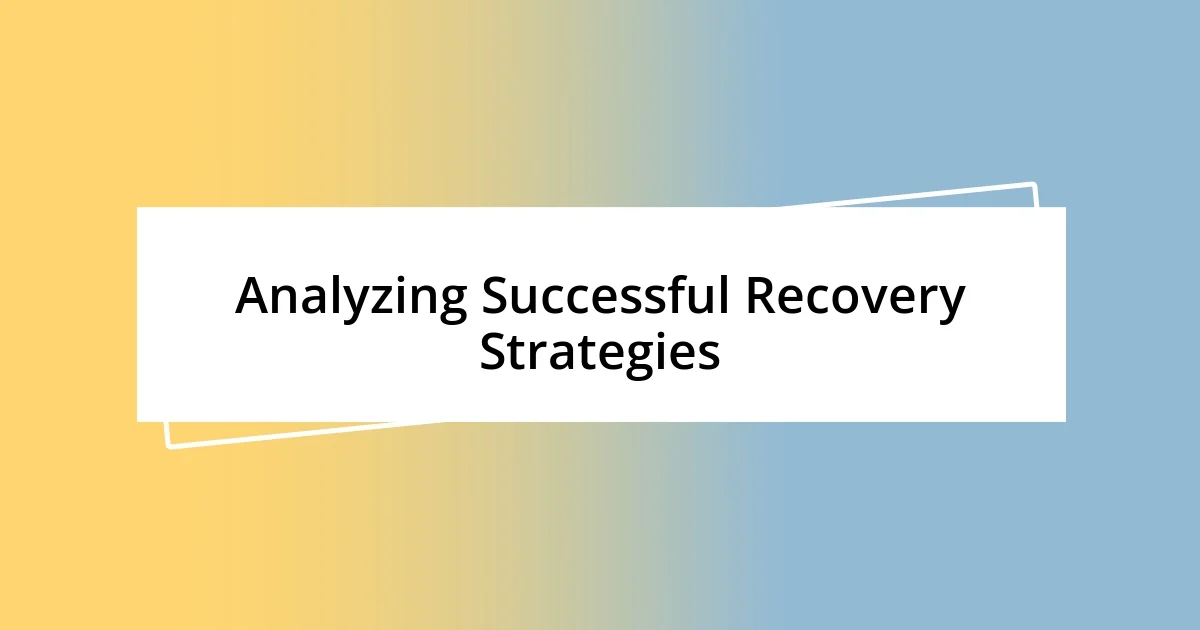Key takeaways:
- Market failures, such as externalities and public goods, highlight the need for social responsibility and collective action in resource allocation.
- Historical market failures like the Dot-com Bubble and 2008 financial crisis emphasize the importance of financial literacy and sound business fundamentals.
- Successful recovery strategies include adaptability, rebranding, and incorporating customer feedback, which foster resilience and innovation for future ventures.

Understanding Market Failures
Market failures occur when free markets fail to allocate resources efficiently, leading to undesirable outcomes. I remember a time during my college days when we studied a case about the 2008 financial crisis. It struck me how greed and misjudgment led to a cascading failure in the housing market. Isn’t it alarming to think that individual actions can ripple through an entire economy?
One defining characteristic of market failures is the presence of externalities, which are costs or benefits affecting third parties not involved in a transaction. For instance, think about those times when a factory pollutes a river—it not only harms the environment but also affects the health of local communities. I often wonder if business owners grasp the full impact of their actions on society. It feels crucial to engage in discussions about social responsibility and the long-term effects of neglecting these externalities.
Another vital aspect of market failures is the existence of public goods, such as clean air or national defense, which are non-excludable and non-rivalrous. Reflecting on my experiences at community events, I’ve often seen how the absence of personal gain in public goods can discourage investment. Have you ever pondered why we wait for governments to step in and solve these issues? Ultimately, understanding market failures reveals the intricate balance between personal responsibility and community well-being.

Common Reasons for Market Failures
When considering the reasons for market failures, one common culprit is asymmetric information. I vividly recall my first job in a retail setting, where I learned that sometimes, customers know more about products than the sales staff. This discrepancy can lead to misguided purchases and ultimately, dissatisfaction. It made me realize how essential transparency is in establishing trust within the market.
Other fundamental reasons contributing to market failures include:
- Monopoly Power: When a single company dominates, it can manipulate prices.
- Externalities: The costs or benefits of a transaction that affect others.
- Public Goods: Goods that are under-provided in a free market, like lighthouses or street lighting.
- Incomplete Markets: Situations where certain goods or services are unavailable or not sufficiently provided.
- Poorly Defined Property Rights: Unclear ownership can lead to resource overuse or destruction.
Each element interconnectedly influences how effectively a market can operate, and recognizing these patterns has deepened my appreciation for balanced economic systems.

Learning from Historic Market Failures
Reflecting on historical market failures, I find the case of the Dot-com Bubble particularly compelling. In the late 1990s, excitement around internet startups overshadowed basic business principles, leading to unsustainable investments. I often think about how thriving companies crumbled overnight, leaving investors with nothing but shattered dreams. Doesn’t it make you wonder what lessons we might still be ignoring in today’s tech-driven society?
Looking back at the 2008 financial crisis, I am reminded of the critical importance of financial literacy. Many homeowners became embroiled in risky mortgage agreements without fully understanding the implications. This experience resonates deeply with my belief that education in financial matters is essential for preventing future market meltdowns. Have you ever experienced the anxiety of not knowing where your money was going?
I’ve realized that these historical failures expose vulnerabilities in our economic systems. It’s quite poignant to see how these moments in time prompt introspection about responsibility among investors, consumers, and policymakers alike. Remember, every market misstep offers invaluable lessons that can help us navigate future challenges.
| Market Failure | Key Lessons |
|---|---|
| Dot-com Bubble | Importance of sound business fundamentals over hype |
| 2008 Financial Crisis | Need for financial literacy and transparency |

Analyzing Successful Recovery Strategies
To analyze successful recovery strategies, it’s essential to recognize the value of agility in business operations. I once worked with a small startup that faced a significant downturn due to unexpected competition. Instead of digging in their heels, the leadership shifted their focus toward more niche markets. Have you ever witnessed a company recalibrating its approach to survive? It’s inspiring to see how adaptability can breathe new life into a struggling business.
Another remarkable recovery strategy I’ve observed is the power of rebranding in the wake of a market failure. A friend of mine was part of a company that had a product fail spectacularly. Rather than wallowing in negativity, they embraced the feedback and transformed their branding completely. I still remember how they launched a new campaign, capturing the hearts of their audience by emphasizing authenticity and connection. Isn’t it fascinating how sometimes all it takes is a fresh perspective to turn things around?
Furthermore, integrating customer feedback into product development has proven invaluable in many recoveries I studied. In one instance, a well-known snack brand faced backlash over health concerns. They didn’t ignore the complaints; instead, they invited consumers to participate in creating a healthier alternative. This collaborative mindset not only salvaged their reputation but also fostered a loyal customer base. Can you think of a time when listening to your audience made all the difference? It’s a powerful reminder of the importance of community support in overcoming setbacks.

Implementing Lessons in Future Ventures
In my experience, I’ve learned that reflecting on past failures can significantly shape future ventures. For instance, when I started my first small business, I meticulously analyzed why a nearby competitor failed. They ignored customer feedback, which led to a decline in their relevance. Realizing this, I made it a priority to engage customers regularly, offering them a voice in shaping my offerings. Have you ever felt that listening to your audience can be your secret weapon?
Adopting a mindset of continuous improvement is another vital lesson. A few years ago, a colleague of mine faced a daunting setback in a product launch. Instead of merely troubleshooting the issues, they conducted a thorough post-mortem analysis, delving into what went wrong and how to enhance their approach. This proactive stance not only salvaged their next launch but also instilled a culture of resilience within their team. Doesn’t it inspire you to think about how failure can spur innovation if you embrace it?
Moreover, I find that combining innovation with established best practices is key. In one of my projects, I experimented with a cutting-edge marketing strategy while simultaneously leaning on proven techniques from my earlier ventures. This blend not only helped me stand out but also kept my announcements grounded in effective methods. It’s a thrilling balance to strike—taking bold steps while respecting what has worked before. Have you ever struck that balance successfully, and what did it teach you?

Measuring Long Term Market Success
Measuring long-term market success transcends just tracking profits. I recall working on a project where we emphasized customer satisfaction metrics over sales figures. By regularly checking in with our user base, we found that loyalty significantly boosted our performance in the long run. Isn’t it fascinating how deeply understanding your customers can lead to sustainable growth?
Another significant aspect is the importance of brand reputation. I remember a brand I admired that faced a public relations crisis. Instead of running from it, they owned up to their missteps, which ultimately strengthened their reputation. They revealed the behind-the-scenes efforts to improve and build trust with their audience. Have you ever considered how transparency can impact a brand’s longevity in the market?
Lastly, I believe investing in innovation is crucial for measuring long-term success. I once joined a company that dedicated a portion of its budget to research and development, even during tough times. This commitment paid off when they launched a next-generation product that dominated the market. Isn’t it interesting how prioritizing innovation can keep a brand relevant for years?














